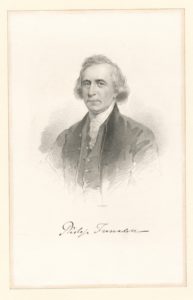So, over this past weekend I was sweating over a long-overdue article [hi, Sean!] on Philip Freneau, the so-called “poet of the Revolution” who is probably better known these days, deservedly in my view, as the American republic’s first major journalistic gadfly. Freneau was a good deal more than that as well, since his National Gazette was closely associated with the emergence of the first opposition political party, the Republicans (or Democratic Republicans to distinguish it from the modern GOP), which was first publicly named and its principles first spelled out in his pages.
Freneau was also a bitter critic of the elective quasi-monarchy that the presidency almost immediately started to become, and one of his most frequent themes was the overpowering influence of “great names,” like George Washington, “over the human mind.” Freneau recognized that putting a face and name people liked and respected on a government, personifying it in a word, was a good way to distract even good republican citizens from the potentially unrepublican policies and values of that government. Once the officer and the office were thoroughly conflated, popular veneration of the great personage would make criticism of the government seem churlish and rather treasonous. Then you had monarchy — we might just call it something more general like autarchy — whether the chief magistrate was called “King” or not. Once a single man or family had been elevated over all the others, any hopes of a society based on republican political equality were destroyed. As Freneau or a like-minded contributor wrote over the pseudonym “Cornelia,”
No character or place ought to be sacred in a republican government as to be above criticism. Inviolability and infallibility are royal qualities, which slaves only can comprehend. . . . In a free government every man is a king, every women is a queen; each should preserve the individual sovereignty guaranteed by our constitution that “ALL MEN ARE BORN EQUALLY FREE.” To homage any one is to destroy the equality of our sovereignty, and is a degradation of freemen. [Philadelphia National Gazette, 21 Dec. 1792]
Based on this conviction, the over-veneration of leaders was a insult to the human dignity of all, and reason. Freneau made a habit of lampooning the “absurd panegyrics” that issued from orators, artists, and his fellow poets whenever some Great Man died or whenever some landmark of George Washington’s life was reached. “Birth-day odes” to Washington were especially vexatious.
Back to the point of this post. Wading through Freneau’s collected poetry — nothing says “weekend” like Freneau’s collected poetry — I ran across his, er, counter-programming to the choirs of angels that most other writers were unleashing in response to Washington’s death, “STANZAS Occasioned by certain absurd, extravagant, and even blasphemous panegyrics and encomiums on the character of the late Gen. Washington.” Now, Freneau was no Yeats, so I do not make any claims for this piece as Great Literature, but the message is a good one that our time needs even more than Freneau’s did: “Who stuff’d with gods the historian’s page,” the poet asks, “And raised beyond the human sphere/Some who, we know, were mortal here?” I particularly like Freneau’s emphasis on the blasphemy involved in supposed Christians deifying even a great mortal like Washington: “Ye patrons of the ranting strain,/What temples have been rent in twain?” As you can imagine, this snottiness did little to help Freneau’s fading popularity and ever-precarious finances.
At any rate, President’s Day (give or take a week) seemed like an appropriate time for a reminder that democracy needs some disrespect and inappropriateness towards our historical icons in addition to the celebrations. Come to think of it, that might make Freneau the patron saint of the blogosphere.
P.S. Thank you, readers, and editors, for letting me work out my mental blocks in public.
This article originally appeared in issue 8.3 (April, 2008).
Jeffrey L. Pasley is associate professor of history at the University of Missouri and the author of “The Tyranny of Printers”: Newspaper Politics in the Early American Republic (2001), along with numerous articles and book chapters, most recently the entry on Philip Freneau in Greil Marcus’s forthcoming New Literary History of America. He is currently completing a book on the presidential election of 1796 for the University Press of Kansas and also writes the blog Publick Occurrences 2.0 for some Website called Common-place.
The post Belated President’s Day poetry break: Philip Freneau, Patron Saint of the Blogosphere appeared first on Commonplace.
